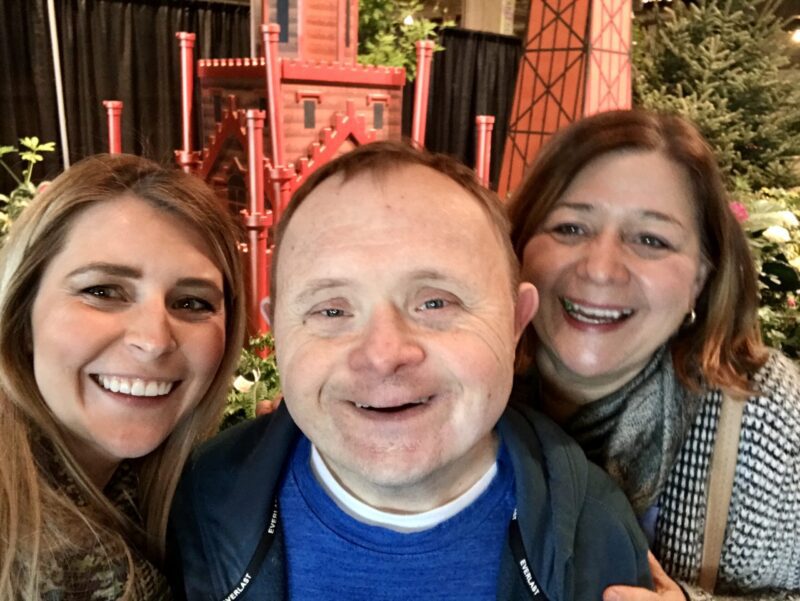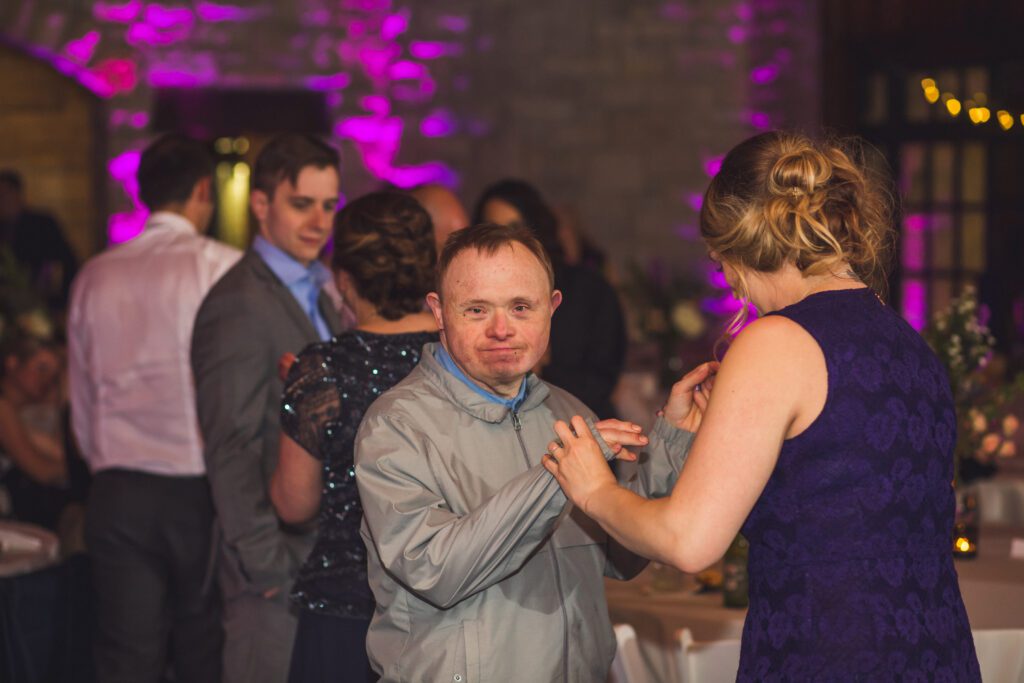by: Angela McPhillips, DNP RN

People with Down syndrome (DS) face unique challenges in healthcare settings. Sometimes the healthcare team skillfully meets these challenges. Other times, the experience is frustrating for the person with Down syndrome, their caregiver, and healthcare providers.
What are some common challenges in healthcare settings that people with Down syndrome face?
What’s it like to receive good and bad communication in the healthcare setting?
How can healthcare professionals provide respectful, high-quality care to people with intellectual disabilities like Down syndrome?
Let’s explore these questions through my perspective as both a registered nurse and caregiver of a family member with Down syndrome.
Challenging Healthcare Situations
Common health issues among people with Down syndrome are heart defects, respiratory problems, and thyroid conditions. They also have a higher risk of developing diseases like leukemia and Alzheimer’s.
These health concerns mean that individuals with Down syndrome interact frequently with the healthcare system. This ranges from check-ups with their primary care doctor to long inpatient hospitalizations.
Despite this, doctors and nurses receive little training in caring for people with Down syndrome. In fact, there is no standardized training framework for medical and nursing students to learn about caring for patients with intellectual disabilities (ID), including Down syndrome. Many physicians report limited knowledge and a lack of confidence in taking care of patients with ID.
Sadly, this lack of knowledge and confidence leads to poor health outcomes in this population. Many times, this also results in negative interactions between healthcare providers, patients with DS, and their caregivers.
In practice, doctors, nurses, and other healthcare providers may struggle to simply communicate with people with Down syndrome and their families. This is especially true when the person with Down syndrome has limited verbal communication.
Real Stories of Communication in Healthcare
Uncle Johnny is my loved one with Down syndrome. Johnny is my mom’s brother. He is non-verbal, needs direct assistance with most activities of daily living, and his smile can light up a whole room.
My mom and I became his co-guardians upon my grandma’s passing. We manage his affairs and provide his direct care. My mom provides daily care and I provide respite care. We are both directly responsible for his healthcare.
Some healthcare experiences with Johnny stand out as the best and the worst.
What defines these interactions? Communication.
Communication sets the tone for the entire healthcare interaction and can make or break the experience.
Some of the worst healthcare experiences we’ve had typically started with the healthcare provider not even greeting Johnny. No smile, no hello, no acknowledging that he was in the room.
These interactions were typically unproductive: Johnny refused to roll his sleeve up to have his blood drawn. Johnny refused to undress for a head-to-toe exam. Johnny refused to let the nurse place an IV for necessary medications.
Johnny did not comply with the healthcare provider’s request because he was not comfortable.
What helps Johnny feel comfortable?
A healthcare provider who builds rapport with a warm greeting, a smile, and an introduction. One who shakes his hand and asks him to do something directly, rather than telling my mom or me what he needs to do.
Our best healthcare experiences centered on direct, respectful communication. Not only with Johnny but with us, his caregivers. Everyone felt safe and respected, including his healthcare providers. Johnny complied with requests and was a willing participant in his healthcare.
These positive experiences involved triadic communication. This means the healthcare provider speaks to the patient first, even if they have limited verbal communication. They use caregivers to facilitate communication. Caregivers know their loved ones the best and can share insights and preferences that will optimize healthcare interactions.

Push for Change
There are several ways to improve healthcare experiences for people with Down Syndrome.
Improve Medical Training and Education
Proper training can address the knowledge gap among healthcare professionals in caring for people with Down syndrome. It is crucial to incorporate Down Syndrome-specific education into medicine, nursing, and dentistry curricula. Future healthcare providers should learn about the common medical issues associated with Down syndrome, as well as the unique care requirements of this population.
Well-informed healthcare providers can improve the quality of care and health outcomes for individuals with Down syndrome.
Enhance Access to Specialized Care
Access to specialized care is a big challenge for people with Down syndrome, often due to geographic and economic barriers. Expanding telehealth services can address these issues by allowing individuals to consult with specialists remotely, reducing the need for travel.
Increased funding for Down syndrome clinics is critical, as it can enhance their capacity to offer specialized services and support.
Advocate Health Care’s Adult Down Syndrome Center in Chicago is a stellar example of a comprehensive, holistic, community-based clinic that provides expert multi-disciplinary care.
By improving access to specialized care, individuals with Down syndrome can receive timely and appropriate medical interventions, improving their overall health outcomes.
Support Effective Communication
Training healthcare providers in communication strategies tailored to individuals with intellectual disabilities can greatly improve interactions.
Techniques such as using clear, simplified language and incorporating visual aids can help patients better understand their health conditions and treatment plans.
These methods not only facilitate better patient-provider communication but also empower individuals with Down syndrome to be more actively involved in their healthcare decisions. Effective communication can lead to better health outcomes and a more positive healthcare experience for patients with Down syndrome.
Advocating for Down Syndrome Research
Positive healthcare experiences empower people with Down syndrome and contribute to an enhanced quality of life.
DownSyndrome Achieves is on a mission to help people with Down syndrome live the fullest quality of life by prioritizing research.
Research is critical to decrease health complications and develop treatments that maximize the potential of people with Down Syndrome. High-quality research means high-quality healthcare.
Research improves policies and systems that close the gap of health disparities that people with Down syndrome experience.
DownSyndrome Achieves (DSA) is committed to prioritizing and supporting Down syndrome research with its innovative DSA Biobank at Cincinnati Children’s Hospital Medical Center (Ohio).
The DSA Biobank is a valuable resource to support scientific investigations that explore the genetic basis of Down syndrome, associated conditions, and potential therapeutic targets. These research findings lead to medication discoveries and more effective medical interventions and treatments for people with Down syndrome – factors that contribute to a full quality of life.
A Final Note
Fostering a healthcare environment that prioritizes respectful communication and specialized knowledge can enhance the quality of care and health outcomes for individuals with Down syndrome. Through these efforts, we can ensure that healthcare interactions are positive, supportive, and empowering for both patients and their caregivers.